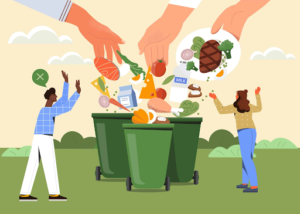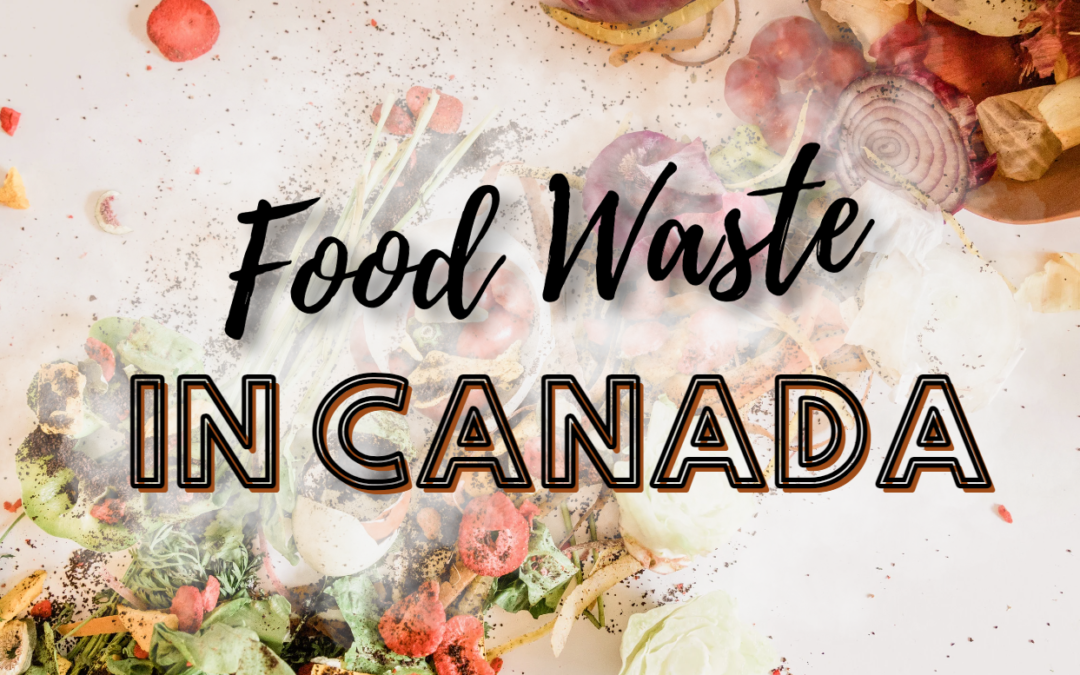Food Waste In Canada
Written By: Sahaer N
Edited By: Kayla Mcmicheal
Designed By: Linda Qi
Published By: Samantha Porte
Food waste is a huge problem, not only in Canada but all over the world.
Food waste refers to food that is knowingly thrown away while it is in the retail and consumption phase’s.
When we throw away food, we don’t just waste the food but also the resources, such as time, energy and water required to cultivate, harvest, package and transport it.

Food Waste in Canadian Households
Canadians are wasting more food everyday, and it’s more than they realize. All the food being thrown away could have been eaten or even used for compost.
Obviously, there is food that cannot be eaten, used, and sold again. For example, tea bags, coffee grounds, bones, vegetable peelings and egg shells.
National Food Waste Council
The National Food Waste council investigated how much food was being wasted in Canadians households in 2022, and the results were shocking.
Canadians wasted 450,000 eggs, dumped 1 million cups of milk down the drain, and threw 2,400,000 potatoes away every single day. Furthermore, 63% of the food thrown away by Canadians was still perfectly edible.
The average sized family in Canadian households waste 140 kg of food a year, leading to a total cost of $1,300.If we count up all the Canadian households that is 2.3 million tons of wasted food, which has a cost of $20 billion yearly.
In conclusion, Canadians waste a lot of food. 30% of that is vegetables, 15% fruits, 13% leftovers, 9% bread and bakery items, 7% eggs and dairy, 6% meat and 20% other food items.
Food Waste Effects on the Environment
Food waste has major impacts on the environment. The 2.3 million tons of food Canadians waste is equal to 2.1 million cars on the road, emitting 6.9 million tons of CO2 into the atmosphere every year. Also, the food rotting in landfills emits methane gas, which is 25 times stronger than CO2 as a greenhouse gas. When methane combines with oxygen in the atmosphere, it creates more CO2. More CO2 lead in the atmosphere will contribute to global warming, the increasing of earth’s temperature.
When food is wasted we seem to forget that there are many people, including children, around the world who don’t have access to clean or good quality food.
Controlling the amount of food we waste everyday can benefit us by; saving money, time and energy. It also benefits the planet by reducing the amount of methane gas and CO2 entering the atmosphere.
Seven Smart Tips to Stop Wasting Food
- Buy only what you need at the moment, to reduce waste and stop food from expiring
- Try cooking meals with recipes you know, so that you buy an appropriate amount of food. You can always spice it up by trying something new, but try to keep to a steady meal plan
- Check your kitchen for all the food you have, and think of a meal you can prepare with what you have on hand. Whatever is missing can be added to your shopping list.
- Plan out nights with friends, so you don’t have to buy or cook any food, and instead order from restaurants or takeout.
- Consider which food items will expire first, and use those earlier in the week.You can prepare meals with meat and seafood first and use packaged food such as dairy products or pasta later.
- You can purchase frozen vegetables, as they will stay fresh in your freezer for a long time, and you can cook them as needed.
- Prepare meals which are easy to freeze like stew, soups, or lasagna. They’ll stay fresh for a long time and can help make easy dinners while reducing waste.
________________________
Works Cited
Warner, J. (2022, January 18). Food waste in Canada: Statistics and impact for 2022. La Merceria. Retrieved September 10, 2022, from https://lamerceria.ca/food-waste-canada-statistics/
10 easy tips. Love Food Hate Waste Canada. (2018, August 15). Retrieved August 28, 2022, from https://lovefoodhatewaste.ca/plan-it-out/10-easy-tips/
Food waste in the home. Love Food Hate Waste Canada. (2022, May 6). Retrieved August 28, 2022, from https://lovefoodhatewaste.ca/about/food-waste/
Food waste. The Nutrition Source. (2019, September 4). Retrieved August 28, 2022, from https://www.hsph.harvard.edu/nutritionsource/sustainability/food-waste/#:~:text=Food%20%E2%80%9Cwaste%E2%80%9D%20refers%20to%20food,the%20retail%20or%20consumption%20phases.
Nature Canada. (2018, June 25). The impact of food waste on the environment. Nature Canada. Retrieved August 28, 2022, from https://naturecanada.ca/news/blog/the-impact-of-food-waste/#:~:text=The%20environmental%20impact%20of%20food,greenhouse%20gas%20than%20carbon%20dioxide.
World Wildlife Fund. (n.d.). Fight climate change by preventing food waste. WWF. Retrieved August 28, 2022, from https://www.worldwildlife.org/stories/fight-climate-change-by-preventing-food-waste

